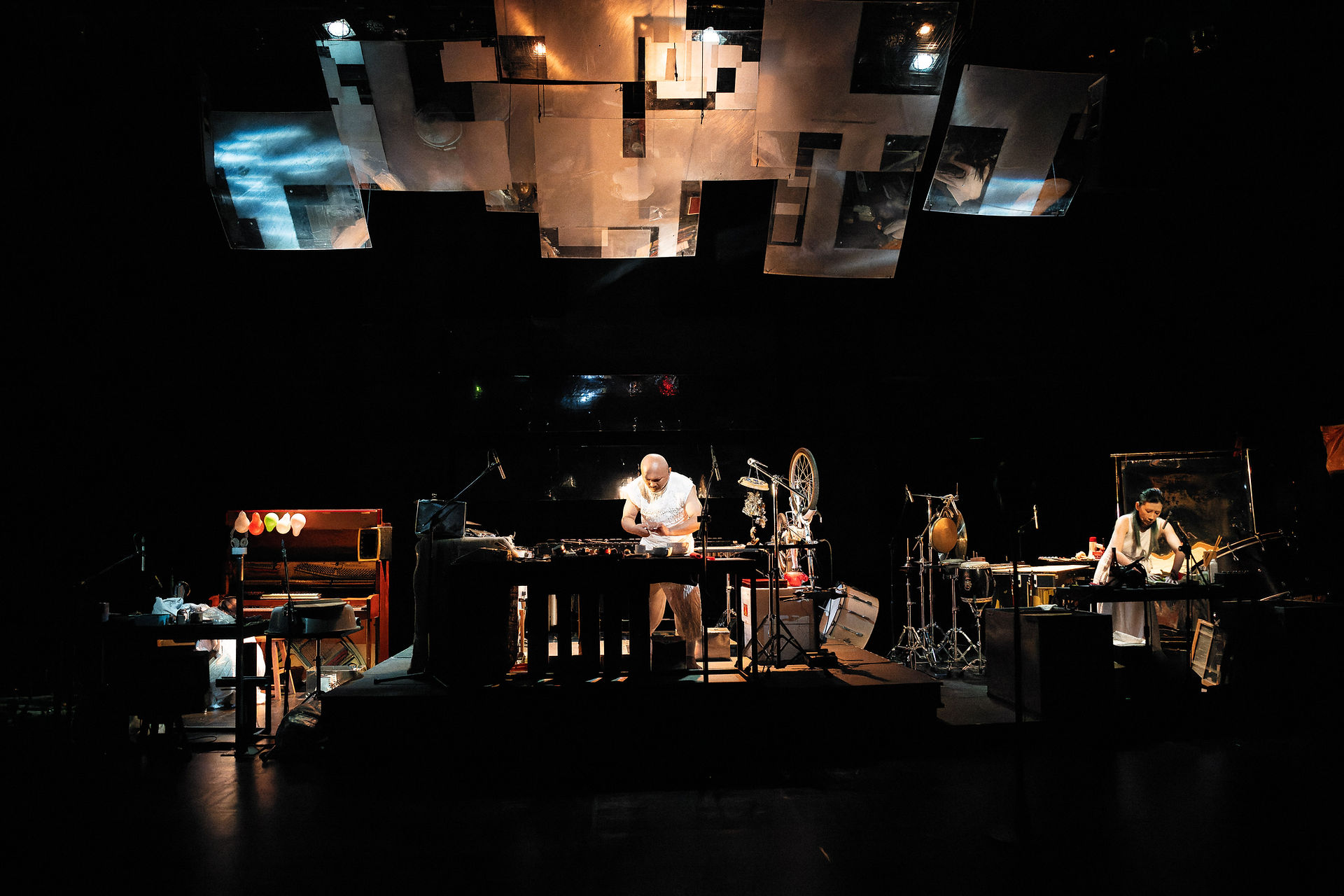
自由擊
FREEDOM BEAT
20伍零 Fifties
耳機,就是你的時光機
在虛擬的 2050 年,一個失去歷史回憶 的平行時空,一群聲音採集工廠/實驗室的 員工,從一批來自 1950 年代的生活物件中, 發現殘存的記憶聲響。
飽受戰火攻擊後的土地,從一位裁縫師 的記憶片段去窺視臺灣那十年的歷史事件, 聽到第二次世界大戰臺灣兵身份認同的無 奈、戒嚴時期的膽戰心驚、美援帶來的影響、 平民娛樂的金光布袋戲成為有力的政治宣傳 手段、八七水災的浩劫。在壓抑的時代下, 《綠島小夜曲》流傳在所有人的心中,一首 《望你早歸》道出最大的期許,找回失去的 記憶,可能再次經歷痛苦之外,是否能帶來 些許的安慰?抑或是成為蝴蝶的一雙翅膀, 揮舞出未來的一丁點改變?
來的一丁點改變?

演出製作群 Production Team
聲響設計 Sound Design /演出者 Performer
朱純瑩 Chu Chun-ying 劉冠萍 Liu Kuan-ping 葉柏岑 Yeh Po-tsen
音樂設計 Music Design |劉冠萍 Liu Kuan-ping
導演 Director |符宏征 Fu Hong-zheng
編劇 Screenwriter |譚鈺樵 Tan Yu-chiao
擬音顧問 Foley Adviser |胡定一 Hu Ding-yi
樂器設計 Musical Inst. Design & Making |江靖傑 C.J. Artecent
音響設計 Audio System Designer |鐵吹製作 陳星奎 Chen Hsin-kuei
空間設計 Space design |黃祖延 Huang Zu-yan
服裝設計 Costume Designer | Derobe-sawa
視覺設計 Graphic Designer |好神的設計工作室 Gooood Gods Design Workshop
操偶指導 Puppet Training Instructor |黃僑偉 Huang Chiao-wei
製作單位 Production unit |自由擊 Freedom Beat
製作人 Producer |大聲藝術 黃珮婕 Huang Pei-jie
排練助理、字幕 Rehearsal Assistant、Surtitle Operator |佐佐木康介 Kosuke Sasaki
行政人員 Administration Personnel |鄭雅云 Dawn Cheng
舞臺監督 Stage Manager |陳宣妙 Chen Hsuan-miao
舞臺技術指導 Technical Director |鄭偉志 Chen Wei-chih
音響技術執行 Sound technician |徐正錕 Hsu Cheng-kun
燈光技術指導 Master Electrician |萬書瑋 Wan Shu-wei
燈光技術執行 Lighting Technician |郭奕利 Kuo Yi-li、楊鴻偉 Yang Hong-wei、 卓駿鵬 Zhuo Jun-peng
In a fictional future in 2050, a paralleling time and space where historical memories are lost, a group of workers in a sound collecting factory/laboratory discover the surviving memories of sounds in the everyday objects left behind from the 1950s.
From these objects, they have a glimpse of the historical events during the decade through the segments of memories of a tailor, who lived on the land devastated by the flame of wars: the frustration and helplessness of a Taiwanese solider, who fought for the Japanese Imperial troops in the Second World War; the terror and fright during the martial law period; the impact of the US aids; the glove puppetry, an entertainment among folks, being used as a powerful tool for political propaganda; the devastation brought by the Eight-Seven 7 自由擊《20 伍零》 Floods of 1959 in Taiwan, and so forth. In the age of suppression, Green Island Serenade was well-spreading in everybody’s mind, while Wish You Come Back Soon revealed the greatest expectation of all. In addition to making people experience the pains once again, will the re-discovery of the lost memories bring some sort of comfort? Or will it become a pair of a butterfly’s wings, which bring forth a little bit of changes by flapping?
Freedom Beat: Fifties, focusing on the popular music in the 1950s in Taiwan, is a sequel of Sweet Revenge, which features the 1930s. But why is the 1940s skipped? That’s because during the 1940s, the Second World War and Chinese Civil War occurred one after the other, and Taiwan was severely bombarded, where disaster prevention drills aimed for airstrikes but not for earthquakes. The memories of this period had faded away. It was then followed by 38 years of suppression, the second longest period of martial law in the world, in which no freedom of thinking and expression was available, but in contrast, hidden phenomena of cultural integration and hybrid emerged in popular music. The pains of the era became the nutrition for artists, leading to the outburst of creations with intense emotions.
Would people be happier without the memories of the past and historical wounds? The year of 2050 is just around the corner. It does not seem far away and may not differ too much from the present, either. However, after going through so many major events in 2023, everything seems so uncertain all of a sudden that nobody can say for sure that he/ she knows what 2050 will look like. At such subtle timing, we decide not to look back at the 1950s from the present but from the perspective of the near future.
In addition to telling stories with music, it is our hope to focus more on the sound theater in this production. By rearranging those iconic songs at that time and reducing the use of music instruments, we use various materials, such as papers and glass jars, from the recycle bins to “present the scenes with sounds.” By means of the “semi-radio drama,” we employ the foley technique in film-making and the latest sound technology -- Spat Revolution and Spat5 package Max/MSP, a software suite for spatialization of sound signals, developed by IRCAM (Institute for Research and Coordination in Acoustics/Music) – to provide audiences with the Binaural experience through headphones in some parts of the performance.
The self-made instrument representing 2050 is blanks in the creation, where we welcome different handicraft articles to fill in and thus inspire all possible variations for this work